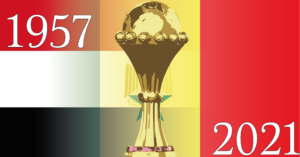Football is globally a big deal, one of the few things that everyone in the world can come together for regardless of race, religion, or any other thing that separates us in our day-to-day struggles.
It’s because of this, that the game has evolved from friends chilling in the backyard, to acting in some way as a political show of power. Similar to hosting the Olympics, it’s a big deal to be hosting the world cup, countries go into debt to build the infrastructure to show off their spot on the globe to the world. It is a signal of economic maturity and political stability, essentially a nationwide version of faking till you make it. Let’s be honest.
But what does this have to do about the African narrative? Well, let me introduce you to Afcon: The African cup of nations.
How did the African cup of nations start?
For those who don’t know similar to how the world has the world cup, or Europe has the Europa, Africa has the African cup of nations. The most prestigious sporting event on the continent. Its very existence is amazing and its impact on the continent is impressive. But to understand this we need to understand how it came about. So let’s go back in time to Sudan in 1957 when the first African cup of Nations was held. Now the year 1957 is an important year because it was the same year that Ghana got its independence, so it was a period of what some would call “decolonization”. That’s right African nations were earning their newfound freedom and one of the first things they wanted to do of course was play football.
Jokes aside, many other regions of the world had their own version of their continental cup established. For example, AFC Asian cup started in 1956. So with growing national consciousness across the African continent, it made sense for the continent to have its own. Hence the birth of the African cup of nations.
This first tournament had 4 participating African nations Egypt, Ethiopia, Sudan, and South Africa. Well technically only 3 of them participated, South Africa, under the apartheid regime at the time refused to have a mixed team opting for an all-white team, so they were banned. With 3 teams in the mix, there were 2 matches played, in the first round Egypt just managed to beat Sudan 2-1, after which they destroyed Ethiopia 4-0 winning the first-ever African cup of nations!!!
WOOOO
How did it develop over time?
Like we said before, 1957 was the start of the awakening of the national consciousness of many African nations, so it’s no surprise that in the 1960s a number of nations from Nigeria, to Somalia, and Kenya to Botswana, fought for and achieved their independence. And with that, their ticket to participate in the African cup of nations. In fact, in 1962, so many nations wanted to be a part of the competition that at long last they had to start introducing qualifying rounds.
As you can imagine with the level of competition increasing, the game, whilst fun, began to represent something more, it became a forum to spread political values and ideas. This tournament was legitimately built by the people, for the people and so many newly independent African governments invested heavily into their national football as a show of pride to put their best foot forward in front of their fellow African nations, a true celebration of freedom and African diversity. In 1963 and 1965, with the enthusiastic support of Kwame Nkrumah (the first president of Ghana), Ghana took home the cup. In 1996 South Africa, now a good chunk less politically racist won the cup for the first and only time on their home turf. 1980 Nigeria won the cup with Segun Odegbami being the top scorer that year (Represent :D).
As the tournament expanded especially entering the 2000s so did the rules surrounding it, whereas previously for players to participate they had to play domestically with African leagues, they are now allowed to participate regardless of the league they are in. Opening the doors for heavy hitters like Didier Drogba, Samuel Eto, Mikel Obi and so many more. From humble beginnings, Afcon truly has grown to be an international celebration of African football and what it means to be African.
Naturally part of what it means to be African is to fight European resistance. Which happens often at the beginning of the year in January when Afcon is usually held. You see, Afcon directly clashes with premier league fixtures, which means club managers often clash with country club managers in the release of their players to their national teams. It just so happens that many of these valuable club players that play in the European leagues are of African descent, putting players in the awkward situation of club or country, nothing is ever simple right! I won’t go into too much in this article, but it goes to show that even in football the African identity carries weight on it.
But why is it a symbol of power?
Good question, besides bragging rights, why is this tournament such a strong symbol of power? Well, I can break it down into 3 points, you may have guessed some of these but humor me for a bit:
It’s a show of national sovereignty
To state the name of a country and claim “this is where I come from”, is a luxury that only came to some just 80 years ago, and others are still yet to be able to say this. To be able to send a team out means that regardless of tribal, religious, or ethnic differences this team of people is a representation of the nation behind them. If a nation does not have a sense of unity or sovereignty it would be impossible for them to participate in such a tournament. Hence the need for independence before participation.
It’s a political statement
Showing up to Afcon in some ways acts as a statement of political stability meaning that the country is actually able to fund and support a team to be able to compete. On the other hand, it can be shown as a statement against other participating countries. Such as, in 1996 when South Africa was hosting the Afcon after Nigeria had won the previous year, General Sani Abacha (the then military ruler of Nigeria), threatened that Nigeria would not participate out of fear for the well-being of his players. Some say it was retaliation to Mandela who called for an oil boycott of Nigeria for the execution of Ken Saro-Wiwa (a Nigerian writer and environmental activist – I might write about this at some point). Who knew kicking a ball could get that deep…I did :D.
Its a show of Economic Prosperity
This perhaps is shown more by hosting nations than participants. But it’s not free to play football. For participants, the government would need to pay for a couch, kit, training, training grounds, etc in order to prepare its team for the tournament. For the host, besides having an actual stadium to host thousands of foreigners to watch the game, the nation itself must be prepared to handle an influx of visitors, sort of like when your house is messy and you have guests threatening, yes, threatening, to visit. You need to get your house in order to look better than you actually are. There is a lot of economics that go behind tourism and hosting such a large event.
I’m sure there are many other points to be made, the main one being that the African cup of nations is a prestigious event, and to be part of it, one must work hard to fit the bill. To even have a seat at the table, is a show of economic and political power.
So what?
My go-to thing at this point is usually to say how the world needs to know more about Africa, and that the lack of education on the topic is a function of the systemic injustices and general condescension towards African nations. You know, big tings, but honestly while researching this I realized how much I didn’t know about other regional tournaments and what it must mean to them. So instead I’ll say this:
The African cup of nations is a symbol of one of the first times many African nations took a stand in identifying themselves on a global stage and collaborating with those around them. It’s a contest that should be celebrated, studied, and hyped up, not necessarily by the world, but by us! We need to push ourselves to give it the best coverage, our players the best investment of time and yes money. Many are already doing this, so not to say it’s not being done, but if we want to see ourselves celebrated on a global stage we better first celebrate ourselves on the stage we made for ourselves.

